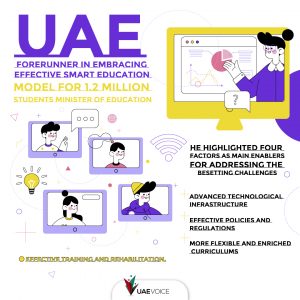The Minister of Education in the UAE confirmed that the country was proactive in adopting education systems, strategies, plans and scenarios that would achieve an effective smart learning system surrounded by educational capabilities and educational resources of multiple importance and capabilities, and that for years thanks to the guidance and support of rational leadership, which prepared the way to activate the Smart learning system for about 1.2 million Emirati school students, at 100% without significant obstacles, and rapid response to the requirements of the current stage as a result of the spread of the Coronavirus, while many countries suffered extreme difficulties, which negatively affected the continuation of their learning journey.
UNESCO strategies challenges facing education systems
This came during a regional Arab online seminar organized by the UNESCO Regional Office for Education in the Arab Countries – Beirut, in partnership with UNESCO Paris and the Regional Center for Educational Planning on the future of education after the Corona pandemic, with the aim of shedding light on the challenges facing education systems with regard to ensuring continuity of learning Students and lessons learned during the Corona crisis, and to delve into the proposed plans and strategies and analyze them to define a framework for seeing education after the Corona pandemic.
UAE Minister of Education clarifies the future of education systems after the Corona epidemic

Hussein Ibrahim Al Hammadi talked about the future of education systems in the UAE after the Corona pandemic, stressing that the regional meeting on the future of education after COVID-19 is extremely important because it deals with a vital file, and it may be the most important and educational issue at the global level, and it has extensive discussions, as it requires a fundamental transformation. He is great in educational practices and needs innovative educational strategies and policies, new educational tools, and close cooperation between countries towards institutionalizing educational systems that are able to adapt to the new reality.
He said that the possibility of improving the educational frameworks and achieving the best educational opportunities, after the Corona pandemic, depends on our ability to work to address the challenges and problems that have arisen and at the same time, and build on the educational achievements that have emerged on several levels, in order to ensure equitable and inclusive education for all and to devote Lifelong learning without exception for a specific class or segment.
Education systems development beyond COVID-19
The Minister outlined the potential for education development beyond COVID-19 in terms of its ability to absorb the current updates in four basic factors, namely infrastructure, policies, organized frameworks, developed curricula, qualification and training, indicating that the development of educational outcomes is based on important rules, which are summarized in smart learning and the care system and activities, Students’ skills, and strengthening the higher education system.
He stated that the outputs of any educational system should be measured according to the fundamentals, the most important of which is building an integrated monitoring and monitoring framework for performance evaluation, providing a smart measurement system, and measuring impact, as well as the importance of working in another direction, which is achieving partnerships for education, through participatory education that is based on exchange Experiences and investment in education at the country level.
The director of the Regional Center for Educational Planning, Dr. Mahra Al-Mutaiwi, confirmed that the COVID-19 pandemic had great effects on the educational systems in the world and had to re-prioritize and change its strategy, as this pandemic affected its climax on the education of 1.6 billion students who stopped going to schools and universities and received their education remotely, Which imposed the necessity of providing education in a different and unconventional way, and through various means such as the Internet, television and other means.
The pandemic has created a challenge with regard to the quality of the education provided, which forces the educational systems to develop new frameworks to measure the quality of their education and address the digital divide between students and teachers.





